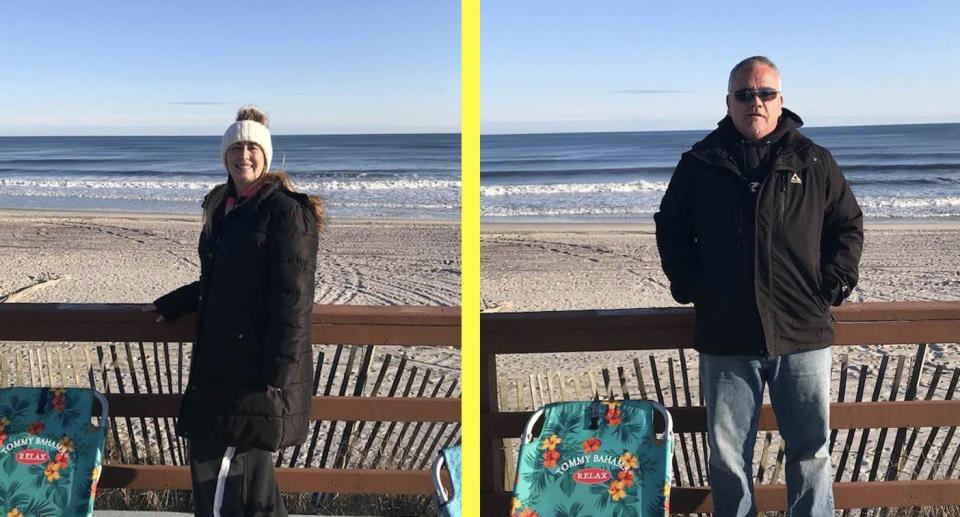One couple on maintaining sobriety in the age of coronavirus: 'Isolation is a big part of using and drinking'
As many of us sit at home during this coronavirus pandemic, jokes and memes about relying on alcohol to get through this time — along with high praise for governors who have deemed liquor stores essential — have been flooding social media feeds. But what about those who are fighting to maintain their sobriety?
Liquor stores might be open for business, but in-person A.A. meetings and support groups are canceled. And what do you do when you get out of rehab, only to be forced to go into isolation — at the very time that you need in-human support?
According to the Centers for Disease Control and Prevention (CDC), more than 15 million people struggle with alcohol use disorder in the Unites Sates — while less than 8 percent receive treatment. For those who do choose recovery, the coronavirus pandemic has made an already-difficult struggle that much harder.
To find out about some of the challenges specific to those in 12-step programs, this writer didn’t have to look far: My cousin George Babcock, sober for seven years, and his wife Patti Babcock, sober for five years, are currently finding their way in this new socially-distanced world. Both agreed to speak with Yahoo Lifestyle about their experiences.
“Alcoholism is a very insidious disease, it sneaks up on you when you least expect it,” explains Patti, who married George last June. “Thank God I'm married to a sober man — and we have separate journeys, because we have to have our own journey, but we also have a journey together in sobriety.” She adds, “We live a sober life, and it's actually a really amazing life.”

Both active members of Alcoholics Anonymous, George and Patti maintain their sobriety in part by supporting fellow alcoholics. “I bring a meeting into the rehab that I was actually in, which is very dear to me,” Patti says. “The way to help someone is to share your experience with them. We don't give opinions, we share our experience with people.”
Now, due to the coronavirus pandemic, measures put in place in many states limit the amount of people that can gather, which has required A.A. to cancel in-person daily meetings, but the need for them has certainly not disappeared.
“Isolation is a big part of using and drinking.” George explains. “It's going to be a lot more difficult for people that are newly sober now to maintain their sobriety because they don't have the outlet that they had when there’s no coronavirus, they don’t have these meetings.”
When Patti first got sober, she shares, “I had to be willing to do anything, because I knew that I was dying,” she says. “When I first got sober, going to meetings was my lifeline. I went two to three meetings a day. My heart hurts just knowing that they don't have that right now.”
George explains that the most important person at any meeting is a newcomer, he says, because that person needs the support in the room so much, and because they serve as a reminder to those who have been sober for years. “It’s suggested that the first day you get out of rehab that you go to a meeting — and if you do do that, then you double your chances of staying sober,” he says. “Now they can't say that.”
Many outpatient facilities are continuing counseling via Zoom video meetings, and active A.A. members like George and Patti are getting creative to ensure that A.A. members get the support they need.
Living close to the beach Long Island, New York, has allowed them to host pop-up meetings on the beach where participants can sit six feet apart.
“It's actually really beautiful.” Patti says. “You have the beach and the water as the background with the waves and we sit at the pavilion, social distance being adhered to, of course.”

Despite the challenges that the pandemic has brought on, the couple has faith that sobriety is still attainable.
“The people that are in the sober houses and the people that are just getting out of rehab, if they really want it, they could have it with doing the Zoom meetings and beach meetings and staying connected and getting a sponsor.” Patti explains. “They’ll be able to stay sober in spite of what's going on, and this could make them even stronger.”
If you or someone you know is struggling with alcoholism, visit A.A.org to find support near you or call 1-800-662-HELP for help in facing mental and/or substance use disorders.
For the latest coronavirus news and updates, follow along at https://news.yahoo.com/coronavirus. According to experts, people over 60 and those who are immunocompromised continue to be the most at risk. If you have questions, please reference the CDC and WHO’s resource guides.
How to maintain your physical and mental health during the pandemic
Taking care of a loved one with COVID-19? Here’s how to stay healthy
Q&A with Dr. Kavita Patel: How to keep your family safe and maintain your mental health

